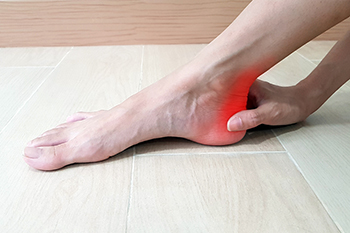
Achilles tendon bursitis occurs when a fluid-filled sac, called a bursa, becomes inflamed around the Achilles tendon. This inflammation can occur behind the tendon, known as posterior Achilles tendon bursitis, or in front of it, known as anterior Achilles tendon bursitis. Achilles tendon bursitis is often triggered by pressure on the back of the heel, such as from wearing poorly fitting shoes or abnormal foot movement. Symptoms typically include pain, swelling, and warmth at the back of the heel, making walking painful. Conditions like rheumatoid arthritis or heel injuries can also contribute to the development of bursitis in this area. A podiatrist can offer treatments like adjusting footwear or recommending custom orthotics, depending on the underlying cause. In some cases, surgery may be an option if other treatment fails to relieve the inflammation. If you are experiencing heel pain surrounding the Achilles tendon, it is suggested that you schedule an appointment with a podiatrist for a diagnosis and treatment.
Achilles tendon injuries need immediate attention to avoid future complications. If you have any concerns, contact Michael Tomey, DPM of Cary Foot & Ankle Specialists. Our doctor can provide the care you need to keep you pain-free and on your feet.
What Is the Achilles Tendon?
The Achilles tendon is a tendon that connects the lower leg muscles and calf to the heel of the foot. It is the strongest tendon in the human body and is essential for making movement possible. Because this tendon is such an integral part of the body, any injuries to it can create immense difficulties and should immediately be presented to a doctor.
What Are the Symptoms of an Achilles Tendon Injury?
There are various types of injuries that can affect the Achilles tendon. The two most common injuries are Achilles tendinitis and ruptures of the tendon.
Achilles Tendinitis Symptoms
- Inflammation
- Dull to severe pain
- Increased blood flow to the tendon
- Thickening of the tendon
Rupture Symptoms
- Extreme pain and swelling in the foot
- Total immobility
Treatment and Prevention
Achilles tendon injuries are diagnosed by a thorough physical evaluation, which can include an MRI. Treatment involves rest, physical therapy, and in some cases, surgery. However, various preventative measures can be taken to avoid these injuries, such as:
- Thorough stretching of the tendon before and after exercise
- Strengthening exercises like calf raises, squats, leg curls, leg extensions, leg raises, lunges, and leg presses
If you have any questions please feel free to contact our office located in Cary, NC . We offer the newest diagnostic tools and technology to treat your foot and ankle needs.
